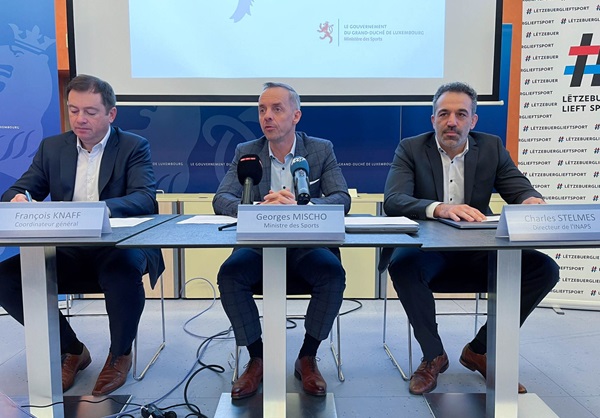 (L-R) François Knaff, Ministry of Sports; Georges Mischo, Luxembourg's Minister of Sports; Charles Stelmes, Director of INAPS;
Credit: MSP
(L-R) François Knaff, Ministry of Sports; Georges Mischo, Luxembourg's Minister of Sports; Charles Stelmes, Director of INAPS;
Credit: MSP
On Tuesday 6 February 2024, Luxembourg’s Minister of Sports, Georges Mischo, presented the goals of sports policy and the main lines of the 2024-2028 government programme.
Sport, as an essential element of social, economic and health life, deserves an ambitious approach, Luxembourg’s Ministry of Sports noted. The minister said: “Our objective is to create an inclusive sports policy aimed at encouraging the practice of sport in all its forms. I am committed to promoting sport by highlighting its multiple motivations and benefits. Furthermore, given the considerable potential of sport in terms of prevention for mental and physical health, our ambitious sports policy will generate savings for our social security system.”
Minister Mischo also stressed that competition, although important, should not be the only objective of sports. “My commitment is to encourage the entire population to adopt an active lifestyle and to facilitate the discovery and practice of sport in quality facilities.”
He also emphasised strengthening the organisational capacities of the sports movement, aiming to have a significant impact on the entire society. These initiatives aim to promote the quality of the sports movement, highlighting values such as integration, inclusion, gender equality, diversity and integrity in sports, including elite sports. In addition, aiming to further promote the development of sports in Luxembourg, strengthened collaboration with other ministries as well as with the municipal sector is planned, the ministry noted.
Sports policy is based on five fundamental pillars, each aimed at promoting sport in specific aspects, notably societal impact, strengthening the sports movement, creating leisure sports opportunities for all, high-level sport and elite sport and sports infrastructure.
Regarding societal impact, the minister noted the aim is to strengthen inclusion, integration, gender equality and cohesion through increased financial support and supervision of sports clubs as well as strengthening volunteering in sports. Improving collaboration between stakeholders at the local level through the municipal sports coordinator was also on the agenda, as well as advancing the project of a National Sports Museum. Reforming the ALAD and anchoring the notion of integrity in sports was another named objective. Collaboration with the Paralympic Committee and the Special Olympics was noted, as well as the introduction of an independent mediation body as a point of contact for athletes and federations.
With a view to strengthening the sports movement, several objectives are envisioned, among which accompanying and supporting the operating autonomy of the National Olympic Committee Luxembourg, an umbrella organisation for sports in Luxembourg (Comité Olympique et Sportif Luxembourgeois – COSL). Aid for local federations and clubs in their evolution towards more professional structures, in particular by developing the organisational capacities of the sports movement, was also noted. Other measures included the development of sports professions, strengthening the training offer of the national institute of physical activity and sports (Institut National de l'Activité Physique et des Sports - INAPS) and promoting collaboration and partnerships between technical and administrative executives of the sports movement through workshops, seminars, events, conferences and forums, among others.
Concerning the extension of the offering of sports and health in sports adapted for all ages and levels, the ministry stressed it aims to strengthen the resources of sports clubs in the development of physical activity and sports programmes. Some of these initiatives include the promotion of injury prevention programmes, support for health and physical activity initiatives at the municipal level and the establishment of a network of sports coordinators in the municipalities to strengthen collaboration between stakeholders.
The ministry aims to support high-level sports and elite sports through the development and extension of the Sportlycée and Luxembourg Institute for High Performance in Sports (LIHPS) offering, the addition of a “sports leave” and continuing steps to establish a civilian career alongside the army's elite sports section, among other things.
Finally, considering infrastructure, the minister noted the need for a more transparent information policy to be put in place to ensure more accessible interventions. He also noted the need for the development of a national and regional sports infrastructure concept and for the development of infrastructure to meet regional and municipal needs, among other measures. The development of sport requires "functional and versatile sports infrastructures that respond to population growth and the needs of clubs and federations", the ministry stressed.








